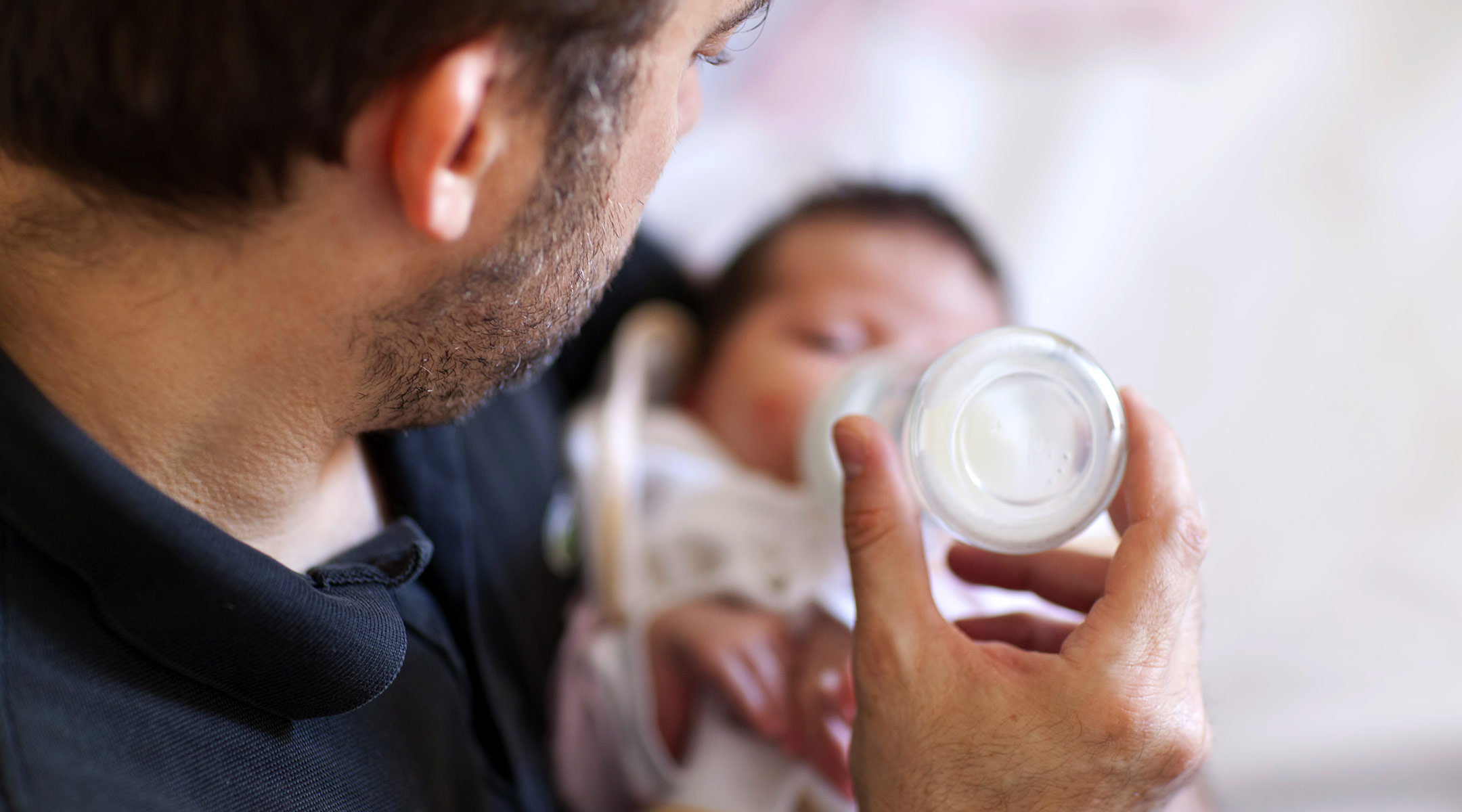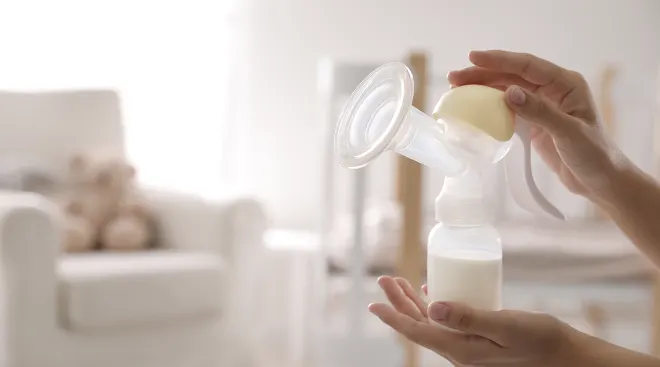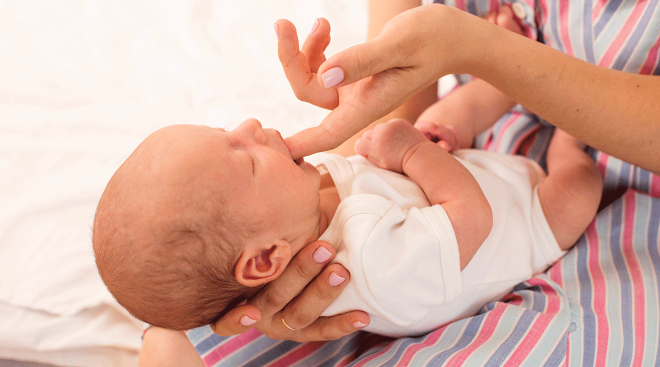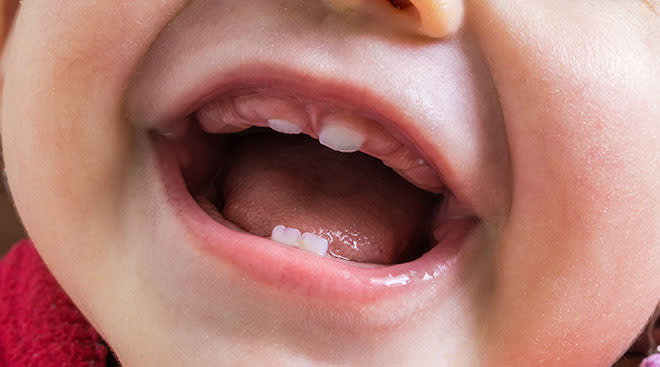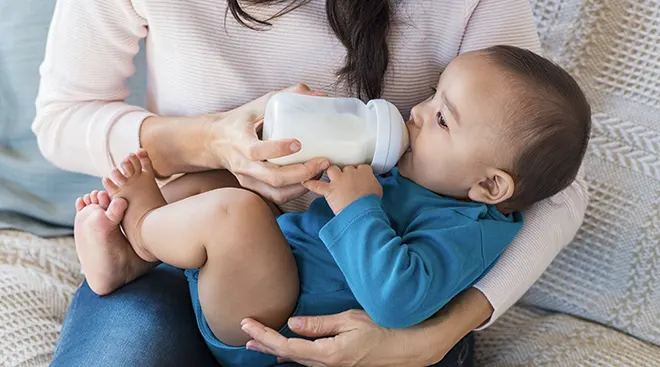Baby Feeding Schedule: How Much Should a Newborn Eat?
If you find yourself fretting over your newborn feeding schedule, you’re not alone. Questions like “how much should a newborn eat?” and “how often do newborns eat?” are some of the most common concerns among new parents. After all, baby is growing by leaps and bounds. In fact, they’ll grow more in the first year than at any other point in their life, doubling in size by the time they’re 5 months old and tripling by the end of the first year—so it’s important to feed baby the fuel they need to power through each stage of development.Whether you opt for breast milk or formula, here’s what you need to know to make sure baby is eating enough.
Wondering how much a newborn should eat? “As pediatricians, we say to feed on demand,” says Jennifer Trachtenberg, MD, an assistant clinical professor of pediatrics at The Mount Sinai School of Medicine. Breastfeeding may be tricky at first; it’s a new skill for you and baby. But once you get the hang of it, breastfeeding is an ingenious, self-sufficient system. When baby suckles, it stimulates your breasts to produce just the right amount of milk to meet your child’s nutritional needs. When baby needs more (because of a growth spurt, for example), they suckle more, causing your body to crank up production.
However, it’s hard to clock exactly how much a newborn eats when you’re breastfeeding. Luckily, there are guidelines to make sure baby is eating enough. First, identify baby’s hunger cues; these could include rooting, licking their lips, bringing their hand to their mouth, wanting to suck and fussiness, notes the American Academy of Pediatrics (AAP).
But how many ounces should a newborn eat at a time? Newborns will only take in up to half an ounce of colostrum (early breast milk) at each feeding during the first couple of days after birth, the AAP notes. Over the next few days, they’ll take in 1 to 2 ounces at each feeding. A couple of weeks after birth, once your mature breast milk comes in, baby will likely take in 2 to 3 ounces at each feeding, working their way up to 4 to 5 ounces by the time they’re 2 months old. To gauge roughly how much milk baby needs, try this quick and easy calculation: Multiply baby’s weight by two and a half. For example, an 8-pound baby should be eating about 20 ounces a day. Again, though, it’s hard to measure this unless you’re bottle feeding.
How often should a newborn eat while breastfeeding?
It’s important to keep in mind that all babies are unique with different feeding preferences. Some may like to feed more often and take in less milk, while others may like to feed less frequently but take in more milk. In terms of how often you should feed baby, you can expect a newborn to breastfeed as often as every two to three hours (or more!), or up to 8 to 12 times a day, according to the AAP. Plus, while baby (and Mom) figure out how to breastfeed, each session can take 20 to 45 minutes, or more. Remember, all that suckling helps to establish your milk supply, so it’s time well spent. As baby’s stomach gets bigger and can hold more milk at a time, they’ll be able to go longer between feedings—about three to four hours at 2 months old, AAP notes. They’ll also get more efficient at nursing.
One advantage to formula-feeding is caregivers can measure every ounce of milk baby guzzles down. But it can pose its own challenges too: While babies are blissfully free from concepts like the clean plate (or empty bottle) club, parents aren’t. To help allay any worries, here’s a breakdown of how much a newborn should eat when formula-feeding.
On average, the newborn feeding amount for formula in ounces is around two and a half times baby’s weight in pounds. (So the total amount that breastfed and formula-fed babies need to eat in a day is roughly the same.) But how many ounces should a newborn eat when formula-feeding? In their first week of life, newborns should eat roughly 1 to 2 ounces per feed, building up to 3 to 4 ounces per feed by the time they’re one month old. Expect to add about an ounce per month until baby is eating 6 to 8 ounces of formula at a time, which usually happens when baby’s around 6 months of age. In general, 32 ounces of formula a day is the most baby will ever need, according to the AAP. Keep in mind that babies’ needs and hunger levels vary. If baby always seems hungry after their feedings (i.e. they’re smacking their lips and fussy), bring it up to your pediatrician. It’s possible baby just needs to suck, which can be satisfied with a pacifier, or they may be ready to start eating solids (which typically happens around the 6-month mark.) Also note that baby might not finish their bottle every time—and that’s okay too. If baby’s fidgeting, distracted or turns away from the bottle, they’re likely full. (Keep reading to learn more about overfeeding.)
How often should a newborn eat while formula-feeding?
The newborn feeding schedule for formula can be a little different than it is for breastfeeding. According to Mount Sinai, babies tend to digest formula more slowly, so they go longer between feedings. Consequently, formula-fed babies tend to have more regular feeding schedules, and they typically feed every three to four hours, notes the AAP.
For moms who combo-feed with breast milk and formula, there are no set rules for how often and how much a newborn should get of each. You’ll want to aim for at least eight feedings per day of one type of milk or the other (this frequency will decrease as baby gets older). Since breast milk and formula are nearly nutritionally equivalent, it’s simply a matter of finding the mix that works best for you and baby.
Still wondering how much a newborn should eat, and how often? Refer to the following feeding chart, based on information from the AAP and Centers for Disease Control and Prevention (CDC). It breaks down newborn feeding amounts and provides a baby feeding schedule by age. As mentioned, when baby is around 4 to 6 months old, you can start introducing solid foods into their diet. Keep in mind, though, that this is really to expose them to different tastes and textures. Baby’s primary source of nutrition should still be breast milk or formula. And, remember, while the below chart provides an average baby feeding schedule, your little one may feed differently based on their unique developmental needs. (For more information on the best initial solid foods for baby, click here.
When it comes to newborns, how often you should feed baby depends on how much breast milk or formula your newborn wants. Again, keep an eye out for signs you have a hungry baby, and pay attention to baby’s cues even while you feed. You’ll know they’re still hungry if they’re actively suckling and audibly swallowing. When baby stops suckling, relaxes their hands and has that sleepy “milk-drunk” look, you’ll know they’ve eaten enough.
Checking baby’s diaper can also give you a clue as to whether baby is eating enough, the AAP says. After baby’s first month, seeing a wet diaper every three to four hours (or five to six wet diapers per day) is a good sign. Stools can be more variable: Some babies poop every time they eat, others just once a day—and it can depend on whether baby primarily drinks breast milk or formula.
At the end of the day, “how baby is acting and growing are the most important [signs],” Trachtenberg says. By measuring baby’s weight gain, your pediatrician will be able to tell if your child is thriving. Babies usually gain about 0.5 to 1 ounces per day for the first three months, but keep in mind that the big picture is more important than any single weigh-in. “In general, you want to see baby’s height and weight basically follow their own growth curve,” says Meryl Newman-Cedar, MD, a New York City-based pediatrician and clinical instructor of pediatrics at Weill-Cornell Medical Center.
Still have some remaining inquiries around baby’s feeding schedule? Below, experts answer some frequently asked questions:
Should I wake baby for feedings?
“I tell parents not to wake a sleeping baby,” Trachtenberg says—especially once baby has gained back their birth weight and is continuing to feed every three to four hours during the daytime. (It’s normal for newborns to lose weight in the first few days of life and then gain it back.)
Should I wake baby if they doze off during a feeding?
Some doctors say yes. “When that happens, baby eats so slowly that one feeding runs into the next feeding time—and parents find themselves with little time for anything else,” Newman-Cedar says. Try slightly undressing baby, tickling their feet or patting their bottom to get back on task. For breastfed babies, La Leche League notes they may also fall asleep if they have a poor latch and have to work extra hard to get milk. If baby is consistently falling asleep during breastfeeding, reach out to your pediatrician or a lactation consultant for tips and guidance.
Is baby eating too much?
While baby is naturally aware of when they’re hungry and when they’ve had their fill, it’s possible for well-meaning adults to coax baby into overeating, especially from a bottle. To avoid this, watch for signs baby is full, such as turning their head, pushing the bottle away or fussing. And don’t be too focused on making sure baby finishes every last drop. Trachtenberg suggests putting no more than a half-ounce more than you expect baby to eat at each feeding in a bottle. If baby drains that too, you’ll know it’s time to add a little bit more. But go slowly: Try pausing halfway through the bottle, sitting baby up and burping them—then see if they actually want more.
Should I worry that baby is losing weight?
Don’t stress: It’s totally normal for newborns to actually lose weight in the first few days of life—up to 7 to 10 percent is considered acceptable. Beyond that, your doctor may advise you to supplement with formula to ward off dehydration and low blood sugar. If baby isn’t getting enough calories, you’ll also start to see a lag in growth, Newman-Cedar says. It starts with a decrease in baby’s weight, then length and lastly head circumference, since the body prioritizes the brain when nutrients are scarce. But when it comes to baby’s growth, bigger isn’t necessarily better. It’s all about the growth curve. “If you have parents who are thin and the kid is in the 10th percentile, that’s probably normal for that child,” Newman-Cedar says. However, if baby has a fever; is lethargic; is refusing to eat or vomiting a lot in between feedings; isn’t urinating at least every four to six hours or if baby’s urine is very concentrated (dark yellow), call your pediatrician right away.
Ultimately, parents want the best for their kids—including ensuring that baby is getting enough to eat. Take heart in knowing that as long as they’re happy and healthy, baby’s feeding schedule is likely just fine.
Please note: The Bump and the materials and information it contains are not intended to, and do not constitute, medical or other health advice or diagnosis and should not be used as such. You should always consult with a qualified physician or health professional about your specific circumstances.
Plus, more from The Bump:
Meryl Newman-Cedar, MD, is a New York City-based pediatrician at Upper East Side Pediatrics, an attending pediatrician at NewYork-Presbyterian Hospital/Weill Cornell Medical Center and a clinical instructor of pediatrics at Weill Cornell Medical Center. She attended medical school at the SUNY Downstate Medical Center, and completed her residency in pediatrics at NewYork-Presbyterian Hospital/Weill Cornell Medical Center. She has been in private practice since 1986.
Jennifer Trachtenberg, MD, is a pediatrician with Carnegie Hill Pediatrics in New York City, where she has been practicing for over 20 years, as well as an assistant clinical professor of pediatrics at the Mount Sinai School of Medicine. She earned her medical degree and completed her residency at the Mount Sinai School of Medicine. She’s also the author of two parenting books, The Smart Parent’s Guide: Getting Your Kids Through Checkups, Illnesses and Accidents and Good Kids, Bad Habits: The RealAge Guide to Raising Healthy Children.
Mayo Clinic, Feeding Your Newborn: Tips for New Parents, April 2022
Children’s Hospital of Philadelphia, Breastfeeding Tips for Beginners
Healthy Children (American Academy of Pediatrics), How Often and How Much Should Your Baby Eat?, July 2021
Cleveland Clinic, Colostrum, February 2022
Nutrition in Clinical Practice, Importance of Human Milk for Infants in the Clinical Setting: Updates and Mechanistic Links, October 2023
American Academy of Pediatrics, Newborn and Infant Nutrition, 2023
March of Dimes, Feeding Your Baby Formula, April 2019
Healthy Children (American Academy of Pediatrics), Pacifiers: Satisfying Your Baby’s Needs, December 2012
Cleveland Clinic, Feeding Your Baby: The First Year, September 2023
Mount Sinai, Breastfeeding vs. Formula Feeding, April 2023
Centers for Disease Control and Prevention, How Much and How Often to Feed, April 2022
Academy of Nutrition and Dietetics, Do’s and Don’ts for Baby’s First Foods, March 2021
National Health Service UK, Breastfeeding: Is My Baby Getting Enough Milk?, September 2022
La Leche League, (laleche.org.uk), Sleepy Baby - Why and What to Do, June 2022
Nationwide Children’s, Babies’ Warning Signs, April 2010
Learn how we ensure accuracy of our content through our editorial and medical review process.
Navigate forward to interact with the calendar and select a date. Press the question mark key to get the keyboard shortcuts for changing dates.
































